
Backcountry locations
Terra Nova National Park
Operating season: May 16 to October 13, 2025
There’s no better way to experience the 400 km2 of Newfoundland nature than Terra Nova’s seven backcountry camping locations. Camp on the coast or venture deeper into the forest. Part of the adventure is getting there, with hiking, paddling, or boat drop-off required to reach your site. For a taste of the backcountry try Southwest Arm, a coastal location just a short walk from your vehicle. All locations have bear poles, and pit privies.
Location descriptions
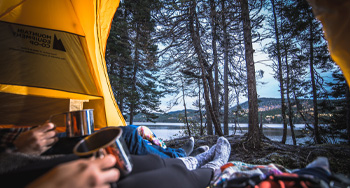
Southwest Arm
- 3 campsites
- Accessible by walking (1 km)
- Communal fire pits available
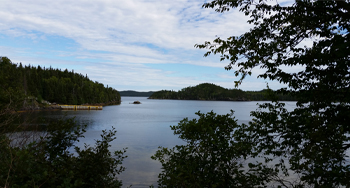
Minchins Cove
- 8 campsites
- Accessible by hiking or boating (14 km)
- Communal fire pits available
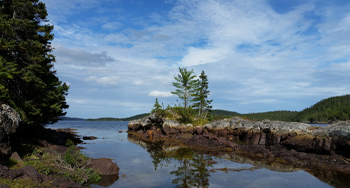
South Broad Cove
- 6 campsites
- Accessible by hiking or boating (16 km)
- Communal fire pits available
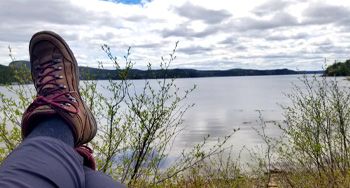
Buckley's Cove
- 1 campsite
- Accessible by hiking (3 km)
- No fire pit available
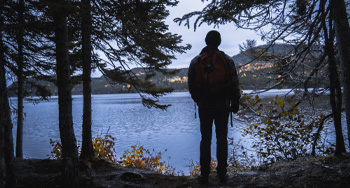
Dunphy's Pond
- 4 campsites
- Accessible by hiking or canoe (5 or 10 km)
- No fire pits available
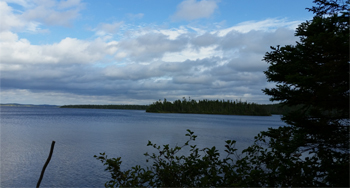
Dunphy's Island
- 3 campsites
- Accessible by canoe (10 km)
- No fire pit available
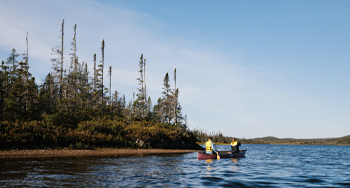
Beachy Pond
- 4 campsites
- Accessible by canoe/portage (2 km)
- No fire pit available
Backcountry locations map
Download the map for backcountry camping locations here.
- Terra Nova National Park Map (PDF, 5.26 MB)
Backcountry tips:
- Obtain your permit in time to reach your destination and set-up camp during daylight hours.
- For public safety reasons, backcountry sites and trails may be closed unexpectedly. Please check with the park prior to departure.
- Secure any wildlife attractants, such as scented items and/or food items, on bear poles or inside a sealed container (do not store in tent).
- All garbage must be packed out from the backcountry. What you pack in, pack out.
- Waste water should be disposed of in the pit privies. Do not use soap in brooks, ponds or the ocean.
- After your trip, return your permit at one of our facilities so we know you have returned safely.
Additional information
-
General camping information
- Kiosk hours:
-
- Malady Head: Check with the park (709-533-2801)
- Newman Sound: Check with the park (709-533-2801)
- Visitor Centre:
- May 16 to October 13, 2025: 10 am to 4 pm.
- After hours registration:
-
- Registration after hours is not available.
- Check in time:
-
- Permits must be issued in time to reach destination during daylight hours. Campers must therefore plan enough time to reach their destination before nightfall.
- All users MUST register with Parks Canada staff.
- Upon arrival at the park, you must pick up your backcountry camping permit at one of our campground kiosks, even if you have a reservation. Permits must be issued with enough time for campers to reach their destination before sunset. Late departures for the backcountry are not permitted. The park reserves the right to forbid a backcountry outing if weather conditions are not suitable, or for any other reason that may jeopardize visitor safety. Users must come prepared for camping in a wilderness setting in variable weather conditions.
- Check out time:
-
- Before 11 am.
- Quiet hours:
-
- 12 am (midnight) to 7 am.
- Maximum length of stay:
-
- 21 nights
- Maximum persons per site:
-
- Group size per permit is restricted to one tent and up to four persons.
- Maximum camping units per site:
-
- 1 tent per site. Camping is restricted to designated sites only.
- Fire policy:
-
- Campfires are permitted only at Minchins Cove, South Broad Cove and Southwest Arm, in designated fire pits;
- Fires are permitted only in fire places provided by the Park; do not build your own campfire pit or circle
- When forest fire danger is high, very high or extreme; open fires are restricted or banned;
- Keep fires small, never leave them unattended and fully extinguish fires before leaving;
- Where no fire pits are provided, use camp stoves only.
- Alcohol Policy:
-
- Alcohol can be consumed on registered sites only.
- Pet Policy:
-
- Pets must be leashed at all times. They must not be left unattended.
- Pet owners are asked to collect and dispose of any solid pet waste.
-
Fees
- For information regarding camping fees for Terra Nova National Park please see our Fees page.
-
Contact information
Administration office (8:30 am to 4:30 pm, Monday to Friday, year round)
- 709-533-2801
Newman Sound kiosk (seasonal)
- 709-533-3159
Malady Head kiosk (seasonal)
- 709-533-6774
Visitor Centre (seasonal)
- 709-533-2942
Reservation service:
- Telephone: 1-877-RESERVE (1-877-737-3783) 8 am to 6 pm local park time; or
- Website: Parks Canada Reservation Service
General park information:
- Telephone: 1-888-773-8888
- 8 am to 8 pm Eastern Time, April to September
- 10 am to 6 pm Eastern Time, October to March
- terranova@pc.gc.ca
Emergency contacts:
Parks Canada has 24/7 Emergency Dispatch Centres that receive reports and assist in the management of visitor safety, wildlife, law enforcement or wildfire incidents.
- 1-877-852-3100
- 1-709-533-6090
- Duty Officer: 1-709-571-0470
Other emergency contacts
- RCMP: 1-709-533-2828
- Ambulance: 1-709-533-2111
- Fire Department: 1-709-533-1111
-
Terms and definitions
- Site-specific
- Guests select the specific campsite or accommodation when they make their reservation. All front-country camping reservations made through the Parks Canada Reservation Service (PCRS) are site-specific reservations.
- Operating season (nights)
- The "operating season" is the nights that the campground is open. Sometimes the campgrounds are open for longer than the period for which they accept reservations. Any dates of the "operating season" outside of the "Reservable Period" are dates that the campground operates on a first come, first served basis only.
- Reservable period (nights)
- The "reservable period" is the nights for which you can make a camping or accommodation reservation. Note that many campgrounds may be open longer than this period, and operate outside of these dates on a first-come, first-served basis.
- Kiosk
- The administration/entrance booth of a particular campground, this is where you "check-in" and register your arrival.
- Vehicle
- Car, truck, motorcycle, truck-camper, motorhome, or recreational vehicle. A motor home pulling another vehicle may count as two vehicles.
- Camping unit
- Tent, tent-trailer, truck-camper, trailer, 5th wheel, motorhome or recreational vehicle.
- Serviced site
-
Refers to a campsite offering either electrical, water, and/or sewer hook-ups or any combination of these services directly on the campsite. Fully-serviced sites offer electrical, potable water, and sewer hook-ups. "Unserviced" sites do not offer any of these hook-ups.
The terms "serviced" and "unserviced" refer to the individual campsites; they do not refer to the washroom facilities or other amenities available at the campground.
- Drive-through site
- Campsite where the driver does not have to reverse their vehicle to exit (there is a separate entrance and exit to the individual campsite). Ideal for larger vehicles and trailers.
- Walk-in site
- Campsite which requires some degree of walking to access the site, and therefore requires a tent. Vehicle will be parked a short distance away.
- Overflow site
- Overflow campsites vary from park to park, and may range from a paved area to park a camping unit (not generally suitable for tents) to a more traditional, grassy site. They are unserviced and are not reservable.
- Accessible site
- A campsite which is accessible to guests with limited mobility.
- Firepit
-
A designated structure for campfires located on a campsite. Check availability, as not all campsites offer a fire pit. In some parks, a fire permit is required to have a fire.
In some parks, only communal firepits are available, and access is shared with other guests.
- Fire permit
- In some campgrounds, guests will require a valid fire permit to have a campfire. A fire permit may include firewood. Please refer to the ‘Fire policy’ section of the QRT for individual campground policies.
- Firewood
- In some campgrounds firewood is sold by the bundle, whereas in others a fire permit may give the holder access to the campground wood pile. Please refer to the ‘Fire policy’ section of the QRT for individual campground policies.
- First-come, first-served site
- Campsites that are available on a first come, first served basis only. These sites are only available to guests who are physically located at the campground. These sites cannot be registered over the telephone or on-line. These campsites may be available for only 1 night or for multiple nights depending on availability.
- Shoulder season
- Shoulder season refers to the season before and after the peak season. While many campgrounds remain open outside of their peak season, the services offered during this period may be limited (please check with the park for more details).
- Entrance pass
- A valid National Park Entrance Pass is required for all visitors to National Parks that have entry fees.
- Daily entrance pass
- A daily entrance pass permits visitor’s unlimited entry to the specified park on a per day basis for the period of time indicated.
- Annual/Seasonal entrance pass
- An annual or seasonal entrance pass permits visitor’s unlimited entry to the specified park for the period of time indicated.
- Parks Canada Discovery pass
- The Parks Canada Discovery Pass permits visitors unlimited entry to the participating Parks Canada national parks and national historic sites across Canada, for a period of 12 months.
Related links
- Date modified :